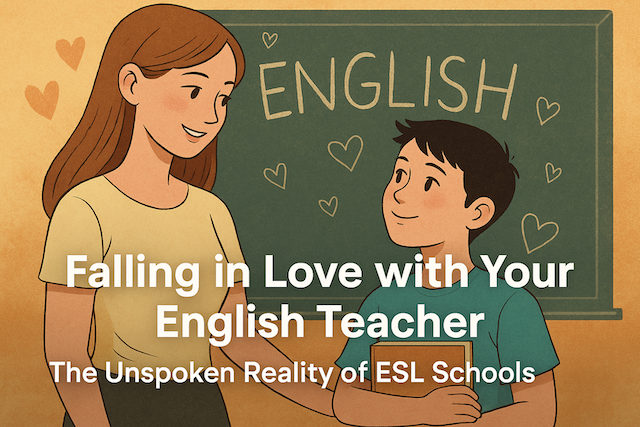Falling in Love with Your English Teacher: The Unspoken Reality of ESL Schools
Contents
- 1 Falling in Love with Your English Teacher: The Unspoken Reality of ESL Schools
- 2 2. Why ESL Teachers Are So Easy to Fall For
- 3 3. Stories from Real Students (Anonymous)
- 4 4. Is It Ethical? The Debate Around Teacher-Student Romance
- 5 5. When Love Helps—and When It Hurts—Your English Learning
- 6 6. Conclusion: Learning English Is Emotional—Just Don’t Lose Yourself
Falling in Love with Your English Teacher: The Unspoken Reality of ESL Schools
It starts with a smile.
Maybe your English teacher greets you every morning with warmth and encouragement. Maybe they patiently help you pronounce that tricky word, or praise you for a well-constructed sentence. Maybe they listen—not just to your English—but to your thoughts, dreams, and fears. And somewhere along the way, you realize: you’re not just learning English anymore.
You’re falling in love.
This might sound like a romantic fantasy, or even a cliché. But the reality is far more common—and far more complicated—than most people think. Around the world, in ESL (English as a Second Language) schools from the Philippines to Canada, from Malta to Vietnam, students and teachers spend hours together every day, often one-on-one. Boundaries blur. Emotions grow. And suddenly, a classroom turns into something else entirely.
Love in the ESL classroom is the unspoken secret of international education. It’s rarely advertised, often discouraged, and almost never written about in school brochures. But if you’ve ever studied English abroad—or taught it—you’ve probably seen it, heard about it, or even experienced it firsthand.
Why does it happen so often?
Because ESL is personal. Unlike traditional education, where students sit in big classrooms and rarely interact with their teachers, ESL learning is deeply interactive. Teachers are trained to be patient, supportive, and emotionally attuned. They correct your mistakes, but also cheer your progress. They become your friend, your mentor, your conversation partner—and sometimes, unintentionally, your crush.
And for students, especially those studying far from home, emotions are already heightened. You’re in a new country, often alone, navigating a foreign language and culture. Your teacher becomes a familiar anchor in an unfamiliar sea. It’s natural to feel close. It’s natural to feel safe. And from there, it’s a small leap to feel something more.
But what happens when that line is crossed?
In this article, we’re going to explore the hidden world of student-teacher relationships in ESL schools. We’ll look at real-life stories (anonymous, of course), the reasons behind this emotional dynamic, and the risks and consequences involved. We’ll also discuss the cultural complexities, the ethical questions, and the ways love can both help—and hurt—your journey in learning English.
This isn’t about scandal. It’s about reality.
Because learning a language isn’t just about grammar or vocabulary. It’s about connection. Communication. Emotion.
And sometimes, love.
2. Why ESL Teachers Are So Easy to Fall For
Let’s be honest: there’s something irresistibly charming about a good ESL teacher.
They smile. They listen. They encourage. They speak with clarity and patience, and they often radiate a calm, confident energy that feels safe and attractive—especially when you’re in a new and unfamiliar environment. For many students, their ESL teacher becomes the first person they speak to in English for more than a few minutes. And more importantly, they become someone who listens without judgment.
That kind of attention is powerful. And, sometimes, disarming.
Unlike in traditional schools or universities, ESL classrooms are often designed for close, interactive engagement. One-on-one classes are common, especially in places like the Philippines or Japan. In these intimate settings, you’re not just answering questions or reading textbooks—you’re talking about yourself. Your hobbies. Your family. Your life.
Suddenly, your teacher knows more about you than your new roommate does.
You laugh together. You share stories. You build trust.
And then—you start to look forward to every class for reasons you can’t quite admit to yourself.
But it’s not just about the amount of time you spend together. It’s about who ESL teachers are.
🎓 ESL Teachers Are Trained to Connect
The best ESL teachers are more than just language experts—they’re communicators, facilitators, and motivators. They’re trained to make students feel comfortable, especially those who are nervous or shy about speaking English. Their job is to build rapport, make students feel heard, and draw out their voices.
In other words: they’re paid to be emotionally available.
Now imagine a student who is thousands of miles away from home. Lonely. Struggling to adjust. They walk into a classroom where someone greets them with a warm smile, remembers their name, and asks how their weekend was.
That teacher becomes more than a teacher. They become a lifeline.
🌐 Cross-Cultural Charm
And then there’s the international element. Many students come from cultures where teachers are distant, authoritarian figures. So when they meet an ESL teacher who’s relaxed, friendly, and treats them like an equal—it can be a cultural shock. A pleasant one.
Add to that the allure of a foreign accent, a different sense of humor, or an unfamiliar way of thinking, and it’s easy to see how admiration can turn into attraction.
Let’s not forget: speaking English is intimate. You’re opening your mouth to say things you’ve never said before, in a language that still feels foreign. When someone helps you do that without fear or shame, it creates an emotional bond that’s hard to ignore.
Sometimes, that bond is just a professional connection.
Sometimes, it becomes a deep friendship.
And sometimes—it turns into something more.
But as we’ll see in the next section, when that line between teacher and student starts to blur, things can get complicated.
3. Stories from Real Students (Anonymous)
Not all student-teacher romances are scandals. Not all are even real relationships.
But many are unforgettable. Sometimes sweet, sometimes awkward, sometimes painful.
Here are a few anonymous stories from former ESL students around the world.
🇵🇭 Cebu, Philippines – “I Couldn’t Tell If She Was Just Being Nice”
Jun, a 24-year-old student from South Korea, came to Cebu for a 12-week ESL program. His 1:1 teacher, Anna, was kind, funny, and full of energy. Every day, she asked about his family, his feelings, and even his dreams. “She looked me in the eye when I spoke,” he said. “That gave me confidence.”
Soon, Jun found himself thinking about her even after class. He started bringing her coffee in the morning and offering her snacks after lunch. She accepted politely, always smiling—but never crossing any boundaries.
“I finally wrote her a letter, thanking her for helping me open up,” Jun recalls. “I didn’t confess my feelings, but I think she understood. After that, she became a little more distant, and I realized I was probably making her uncomfortable.”
Jun didn’t regret it. “She helped me more than she knows. Not just with English. With myself.”
🇲🇹 Malta – “It Was Mutual, but Forbidden”
Sara, a 29-year-old Italian, spent a summer at an ESL school in Malta. Her teacher, Daniel, was just two years older than her and from the UK. The two quickly bonded over literature, sarcasm, and indie music.
“We had chemistry,” Sara says. “He wasn’t my teacher for long, just one week. But we kept talking after class, going out for coffee with other students. Then one night, we stayed late at the beach. It just happened.”
The school had a strict no-dating policy, so they kept it secret. “It was exciting,” Sara laughs, “but stressful too. We knew it couldn’t last.”
They parted ways when Sara returned home. “No regrets,” she says. “It made my English better and my summer unforgettable.”
🇨🇦 Vancouver, Canada – “I Fell, He Didn’t”
Mina, a shy 19-year-old from Japan, developed a deep admiration for her 40-year-old male teacher in Vancouver. He was kind, intelligent, and always encouraged her to express herself.
“I thought he was the most amazing person,” she says. “I knew he was married, but I couldn’t help how I felt.”
Mina never acted on it—but the emotions distracted her. “It was hard to focus in class. I kept hoping he’d notice me more than the others.”
Eventually, she switched to another class. “It helped. But I felt embarrassed. I learned that crushes are part of learning, especially when you’re growing.”
🇰🇷 South Korea – “He Fell for Me, and That Was a Problem”
Luis, a Colombian student in Seoul, felt uncomfortable when his female ESL teacher started texting him outside class. “At first it was about homework,” he explains. “Then she started asking about my weekend plans, sending me photos, calling me late at night.”
Luis felt the boundaries were blurring. “I didn’t want to report her, but it made me nervous.”
He eventually asked to be transferred to another class. “She wasn’t bad, but it crossed a line. I realized it’s not just students who can fall. Teachers are human too.”
These stories show that emotions in ESL classrooms are real, messy, and deeply human.
Sometimes they lead to beautiful memories. Sometimes to confusion or even discomfort.
In the next section, we’ll ask the hard question: Is it ethical?
Where should the line be drawn in student-teacher relationships—and what happens when it’s crossed?
4. Is It Ethical? The Debate Around Teacher-Student Romance
It’s one of the most sensitive and controversial questions in ESL education:
Is it ever okay for a student and teacher to fall in love?
Some say no—absolutely not. Others argue that love is unpredictable and should not be controlled. But when it comes to the ESL classroom, where one-on-one interaction and emotional connection are part of the learning process, the line between professionalism and personal affection can become dangerously thin.
Let’s break down both sides of the debate.
🚫 The Case Against Romance: Power, Pressure, and Professionalism
Many ESL schools have strict policies that forbid any kind of romantic relationship between students and teachers. Why?
Because of power dynamics.
A teacher has authority. They control grades, evaluations, feedback, and sometimes even recommendations for visas or further education. When a romantic relationship forms—whether initiated by the student or the teacher—it introduces a conflict of interest that can impact not just the two people involved, but the entire classroom environment.
Even if the feelings are mutual, there’s always the risk of:
-
Favoritism
-
Miscommunication
-
Emotional manipulation (intentional or not)
-
Student dissatisfaction or jealousy
-
Legal or reputational damage to the school
And then there’s consent. Can a student truly give free and equal consent in a relationship where the other person holds institutional power over them?
That’s why many schools around the world, especially in countries like Canada, Australia, and Japan, maintain a zero-tolerance policy for teacher-student romance—regardless of age or circumstances.
💬 The Gray Area: Adults with Real Emotions
But the debate isn’t so black and white.
In many ESL settings, students are not minors—they’re adults, often in their 20s, 30s, or even older. Teachers too are not always traditional authority figures. Some are part-time tutors, freelancers, or close in age to the students they teach. In places like Malta or the Philippines, teachers and students often eat meals together, go on field trips, and share casual social spaces.
In these contexts, emotions can grow naturally. Not every relationship is abusive or inappropriate. Some even develop after the class ends, when the teacher-student dynamic has officially finished.
There are also cultural differences to consider. In some societies, relationships between students and instructors are taboo. In others, they’re viewed more flexibly—especially if both parties are mature and responsible.
⚖️ The Bottom Line: Boundaries Matter
At the heart of the ethical debate is one key word: boundaries.
It’s not wrong to feel something for someone. Feelings happen. What matters is how those feelings are managed—and whether both people understand the risks and responsibilities involved.
If you’re a student:
→ Ask yourself whether your feelings are real, or just a product of loneliness, admiration, or the emotional intimacy of language learning.
If you’re a teacher:
→ Consider your role and the consequences—not just for yourself, but for your student, your employer, and your reputation.
Because even if the romance seems mutual, the potential fallout can be anything but equal.
In the next section, we’ll explore how love can actually help or hurt your English learning journey—because emotions, like grammar, have rules too.
5. When Love Helps—and When It Hurts—Your English Learning
Love can be a powerful motivator. It can push you to try harder, speak more, and open up in ways you never thought possible. But love can also be distracting, overwhelming, and—when things go wrong—devastating to your confidence and focus.
So how does falling in love with your teacher (or even just having a strong emotional attachment) affect your English learning?
Let’s take a closer look.
💖 When Love Helps: Emotional Fuel for Language Growth
Love can ignite your language journey in surprising ways. Here’s how:
1. Increased Motivation
Students who feel emotionally connected to their teacher often show more interest in class. They’re more likely to do homework, participate actively, and take risks when speaking English—because they want to impress or connect.
2. Emotional Safety
Romantic or affectionate feelings can create a sense of trust. When you feel emotionally safe with your teacher, you’re less afraid of making mistakes, which leads to greater fluency and confidence.
3. Real Communication
Speaking English becomes more than just a classroom activity—it becomes a way to express genuine emotions. This leads to deeper, more meaningful conversations and vocabulary acquisition beyond the textbook.
4. Cultural Learning Through Emotion
When you fall for someone from a different country, you don’t just learn their language—you absorb their culture, their humor, their worldview. Your English becomes more natural, more human.
💔 When Love Hurts: The Risks of Emotional Dependency
But love in the classroom is not always a fairy tale. Here’s how it can go wrong:
1. Distraction and Obsession
Instead of focusing on grammar and conversation skills, your thoughts spiral into “Does he like me back?” or “What did she mean by that look?”
Your learning takes a backseat to emotional drama.
2. Unequal Focus
If a teacher starts giving you more attention—intentionally or not—it may cause resentment among other students, or give you a false sense of progress that isn’t based on skill.
3. Emotional Burnout
If things go badly—maybe your feelings aren’t returned, or the relationship ends—your self-esteem can crash. You may feel embarrassed, avoid class, or even quit the course altogether.
4. Dependency Instead of Independence
Falling in love might make you rely too heavily on one person for emotional support and communication. When the course ends or the teacher leaves, students sometimes feel lost—both emotionally and linguistically.
🧘 What’s the Right Balance?
The key is awareness.
Feelings are natural, and it’s okay to feel attracted to someone who’s kind, supportive, and helps you grow. But remember:
Your teacher is a guide—not your destination.
Use that emotional spark to fuel your learning, not to derail it.
Stay focused on why you came to learn English in the first place.
Let relationships be part of the experience—not the whole story.
In the next and final section, we’ll reflect on how to keep your heart open while staying true to your goals—because English isn’t just something you study. It’s something you live.
6. Conclusion: Learning English Is Emotional—Just Don’t Lose Yourself
Learning a new language is never just an academic task.
It’s personal.
It’s emotional.
And sometimes—it’s romantic.
Falling in love with your English teacher may sound like something out of a movie, but for many ESL students around the world, it’s a real and deeply human experience. When you spend hours speaking, listening, and sharing your thoughts with someone who supports and encourages you, it’s only natural that emotions can grow. That’s not wrong. That’s not shameful.
It’s part of being human.
But as we’ve explored in this article, that emotional journey comes with challenges. While love can motivate and inspire, it can also complicate your learning, create ethical dilemmas, and cloud your original purpose: to grow as a person, and to grow in your ability to communicate in English.
So what’s the answer?
-
Stay grounded. Remember why you’re here.
-
Be aware of your feelings, but don’t let them dominate your actions.
-
Respect boundaries—yours, your teacher’s, and your school’s.
-
Use emotional connection as fuel, not distraction.
Because in the end, English is not just a subject.
It’s a tool.
A bridge.
A voice for your future.
And while love may come and go, your ability to express yourself in English—that stays with you for life.
So go ahead—speak from the heart.
Just make sure your heart knows where it’s going.







